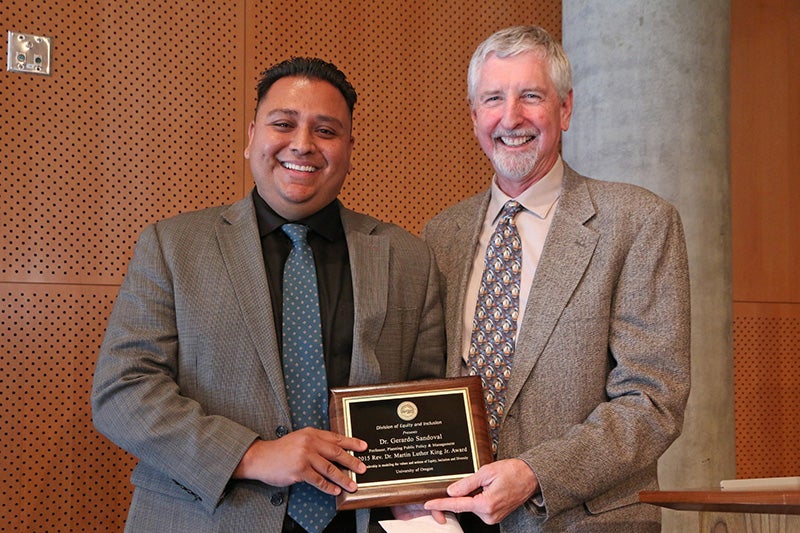Assistant Professor Gerardo Sandoval and graduate student Lok Yee Au have been honored with the Rev. Dr. Martin Luther King Jr. Awards, presented by the University of Oregon. Sandoval was recognized for his work as a faculty member in the Department of Planning, Public Policy and Management, while Au won for her essay written for a class taught by Sandoval.
Sandoval’s “research and scholarship clearly embodies the spirit and goals of Martin Luther King,” said Professor Richard Margerum, head of the Department of Planning, Public Policy and Management. “His work is focused on engaging some of the most marginal members of society in ways that empower people and improve communities. Furthermore, this work is not theoretical, but heavily applied and embedded in communities throughout Oregon and the West. His leadership and dedication to these issues have been a tremendous asset for the University of Oregon and the planning field in general.”

Above: Interim UO President Scott Coltrane (right) after presenting Assistant Professor Gerardo Sandoval with the Rev. Dr. Martin Luther King Jr. Award.
Au—a community and regional planning and environmental studies student— won a MLK Jr. award for a paper written in Sandoval’s class PPPM 532, “Urban Revitalization in Minority Communities." Her winning essay is titled “Environmental Justice and the City of Eugene.”
Sandoval’s work has been recognized by the Oregon Secretary of State and garnered three national awards, Margerum noted, including the Barclay Gibbs Jones Award for best dissertation in planning (2009) from the Association of Collegiate Schools of Planning; a Paul Davidoff Award for his book Immigrants and the Revitalization of Los Angeles (2013) from the Association of Collegiate Schools of Planning; and the Chester Rapkin Award for best planning article in the Journal of Planning Education and Research (2014).
Creating a climate of inclusion that encourages equity and diversity in Oregon and the university is a critical issue, Sandoval said in remarks accepting the award at a luncheon in the Ford Alumni Center.
“In my research I focus on understanding how marginalized immigrants are able to improve their neighborhoods in the face of large-scale redevelopment that historically has threatened and displaced communities of color,” he said. “I try to understand and explain how these communities rely on their social, financial, political, and cultural forms of capital to increase their agency to help these neighborhoods thrive.”
As an example, Sandoval noted his work on a UO outreach effort called The Latino Civic Participation Project. “LCPP is a novel type of needs assessment and community empowerment strategy based on participatory action research that enables Latino community members to directly articulate their local knowledge about community issues and propose solutions,” he said.
Beyond his research and publishing success, Margerum said, Sandoval has shown “a remarkable dedication to students and faculty of color both here at the UO and nationally. “As an assistant professor, he is already taking on national leadership roles to support other faculty and graduate students,” Margerum said.
Sandoval said he tries to instill in students “a critical perspective which helps them understand the larger structural forces that create inequalities for communities of color.” He encourages students “to formulate solutions that acknowledge the strengths and resources within these communities. This is why I have been drawn to the community planning field.”
Sandoval serves as a member of A&AA Equity and Inclusion Committee; associate director, Center for Latino/a and Latin American Studies (CLLAS); member of joint PPPM-CLLAS effort to fund and deliver a summer intercultural competency program for students working with minority communities; and founder of the Latino Civic Participation Project within CLLAS, which aims to empower low-income marginalized Latinos by creating opportunities for meaningful public engagement. Nationally, he lead a tour at the UCLA/USC Association of Collegiate Schools of Planning Workshop for graduate planning students of color. And in 2015, he is helping to organize a workshop at Harvard University for junior faculty of color to secure tenure.
The MLK Jr. awards celebrate those who go beyond prescribed job duties to exemplify the values and principles of racial justice, equity, and inclusion. Award winners are nominated by peers who see them regularly demonstrate qualities and causes the late civil rights leader supported.
The MLK award winners “have shown a deep, lasting commitment to helping students and members of our community succeed, no matter their background or barriers to success,” said Vice President for Equity and Inclusion Yvette Alex-Assensoh. “The spirit of Dr. King is alive and well in them and so many others at the University of Oregon. It fills me with hope.”
Other 2015 MLK honorees were Karla Kennedy, coordinator of scholastic journalism, School of Journalism and Communication; and Deb Casey, director of student support services, University Teaching and Learning Center.
The Rev. Dr. MLK, Jr. Award, sponsored by the Division of Equity and Inclusion, was originally established to honor often under-recognized classified staff, whose various activities and achievements have helped to make the UO campus a welcoming place for all to live, work, and learn. The award has since been expanded to include recognition of university faculty members and officers of administration whose contributions to the campus community uphold and exemplify qualities and ideals either espoused or supported by the late civil rights leader.
